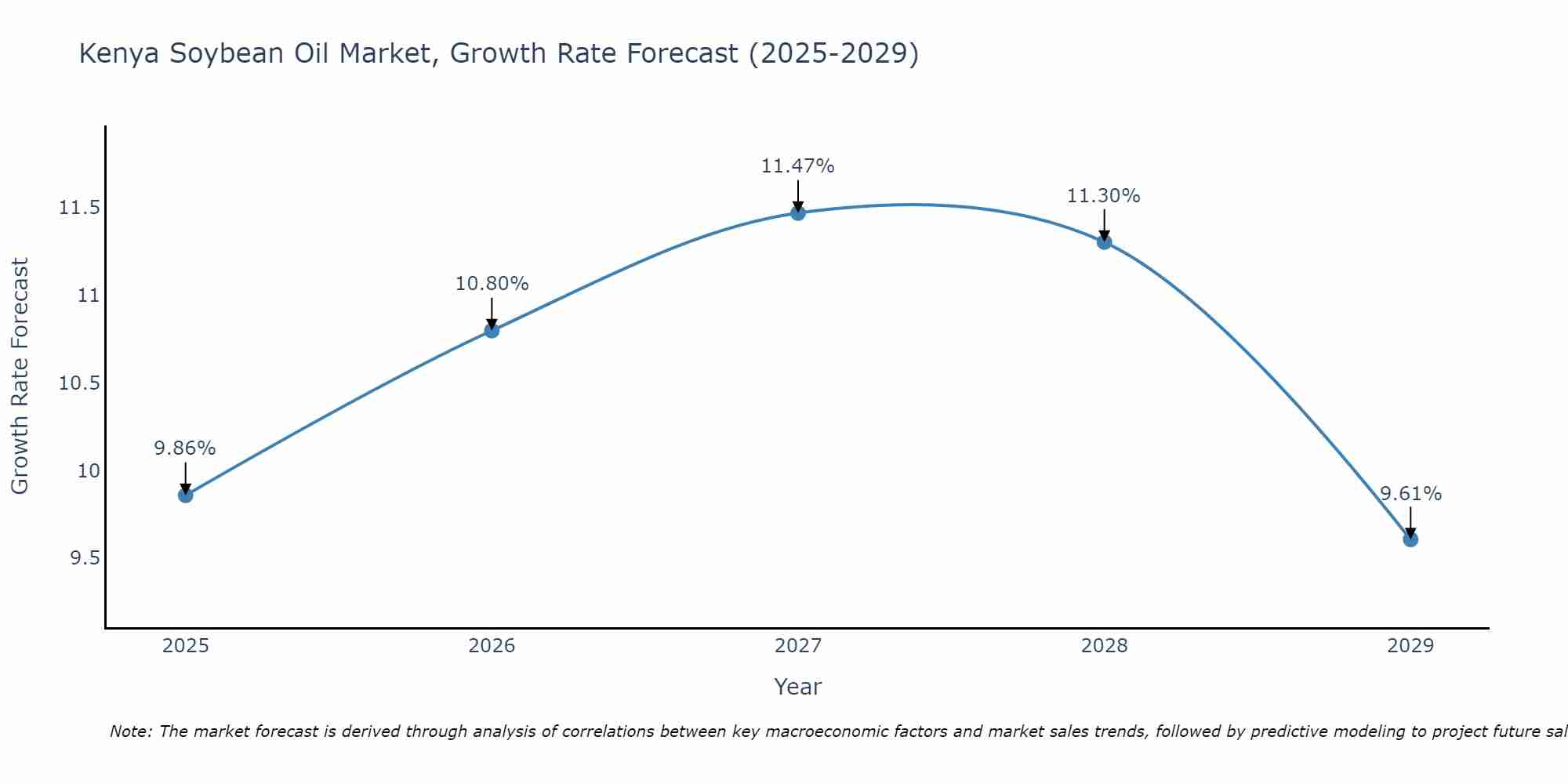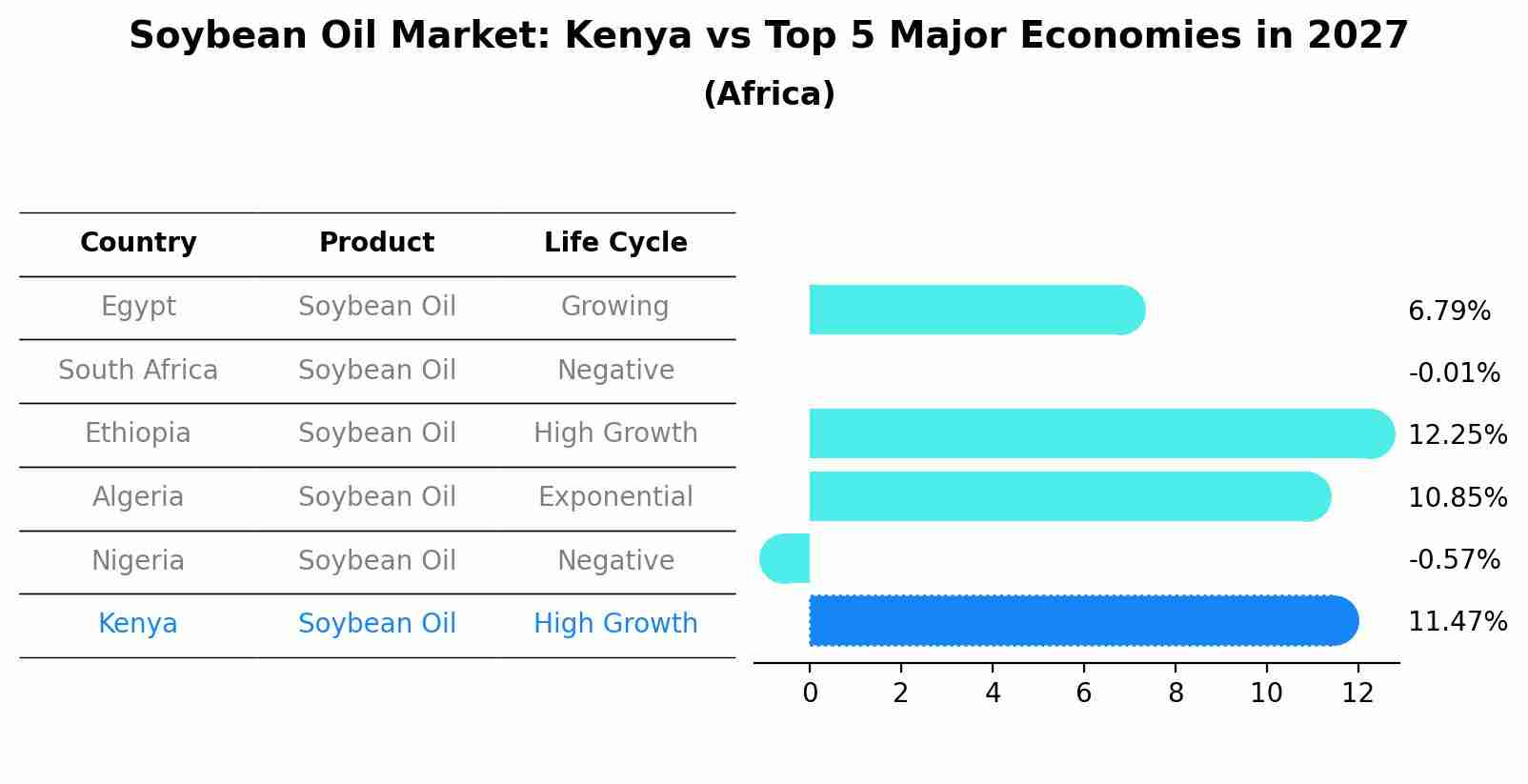Kenya Soybean Oil Market Outlook | Forecast, Growth, COVID-19 IMPACT, Analysis, Companies, Value, Share, Industry, Revenue, Size & Trends
| Product Code: ETC385070 | Publication Date: Aug 2022 | Updated Date: Jul 2025 | Product Type: Market Research Report | |
| Publisher: 6Wresearch | Author: Ravi Bhandari | No. of Pages: 75 | No. of Figures: 35 | No. of Tables: 20 |
Kenya Soybean Oil Market Size Growth Rate
The Kenya Soybean Oil Market is projected to witness mixed growth rate patterns during 2025 to 2029. The growth rate begins at 9.86% in 2025, climbs to a high of 11.47% in 2027, and moderates to 9.61% by 2029.

Soybean Oil Market: Kenya vs Top 5 Major Economies in 2027 (Africa)
In the Africa region, the Soybean Oil market in Kenya is projected to expand at a high growth rate of 11.47% by 2027. The largest economy is Egypt, followed by South Africa, Ethiopia, Algeria and Nigeria.

Kenya Soybean Oil Market Synopsis
The Kenya soybean oil market is experiencing steady growth driven by increasing consumer awareness of the health benefits associated with soybean oil consumption. The country`s growing population, coupled with a rising demand for healthier cooking oil alternatives, has fueled the market expansion. Local production of soybeans is on the rise, with farmers recognizing the crop`s potential for both domestic consumption and export opportunities. Key players in the Kenyan soybean oil market include processors, distributors, and retailers who are actively promoting the benefits of soybean oil through various marketing strategies. The market is competitive, with a mix of local and international brands vying for market share. Overall, the future outlook for the Kenya soybean oil market appears promising, driven by changing consumer preferences towards healthier food options.
Kenya Soybean Oil Market Trends
Currently, the Kenya Soybean Oil Market is experiencing a growing demand for healthier cooking oils due to increased awareness of the health benefits associated with soybean oil. Consumers are shifting towards soybean oil as it is low in saturated fats, high in beneficial unsaturated fats, and contains omega-3 fatty acids. The market is also witnessing a rise in the adoption of soybean oil by food manufacturers and restaurants for its versatile applications in various cuisines. Additionally, the government`s initiatives to promote domestic soybean production are driving the market growth. However, challenges such as price fluctuations, import dependency, and competition from other cooking oils remain key factors influencing the market dynamics in Kenya. Overall, the Kenya Soybean Oil Market is poised for steady growth in the foreseeable future.
Kenya Soybean Oil Market Challenges
In the Kenya Soybean Oil Market, some of the challenges faced include limited production capacity and inconsistent quality of soybeans, leading to fluctuations in supply and prices. Additionally, the lack of advanced technology and infrastructure for processing soybeans into oil hinders efficiency and productivity in the industry. The market also faces competition from imported soybean oil products, which can be cheaper due to subsidies in other countries. Furthermore, inadequate access to financing and extension services for small-scale farmers who grow soybeans contributes to low yields and overall market instability. Addressing these challenges will require investments in infrastructure, technology, and farmer support programs to enhance the competitiveness and sustainability of the Kenya Soybean Oil Market.
Kenya Soybean Oil Market Investment Opportunities
Investment opportunities in the Kenya Soybean Oil Market include the production and processing of soybeans to meet the growing demand for vegetable oil in the country. With an increasing focus on healthy eating habits and the shift towards plant-based diets, there is a rising demand for soybean oil as a healthier alternative to traditional cooking oils. Investors can consider setting up soybean farms for cultivation or investing in processing facilities to extract oil from soybeans. Additionally, there is potential for value-added products such as soy-based food products and cosmetics, offering further investment avenues. Collaborating with local farmers for a consistent supply of soybeans and leveraging technology for efficient production processes can help capitalize on the expanding market opportunities in Kenya`s soybean oil sector.
Jordan Agar Market Government Policies
Government policies related to the Kenya Soybean Oil Market aim to promote domestic production and reduce reliance on imports. The Kenyan government has implemented initiatives such as subsidies for soybean farmers, providing training and access to high-yielding seeds, and offering financial support for the establishment of processing plants. Additionally, there are regulations in place to ensure quality standards and food safety in the production and distribution of soybean oil. The government also encourages partnerships with private sector companies to enhance value addition and increase market competitiveness. Overall, these policies seek to boost the local soybean oil industry, create employment opportunities, and contribute to food security in Kenya.
Kenya Soybean Oil Market Future Outlook
The future outlook for the Kenya soybean oil market appears promising, driven by increasing consumer awareness of the health benefits associated with soybean oil as a healthier alternative to traditional cooking oils. The growing demand for soybean oil is also influenced by the rising trend of healthy eating habits and the expanding food processing industry in Kenya. Additionally, government initiatives to promote soybean cultivation and processing are expected to further boost market growth. However, challenges such as fluctuating raw material prices and competition from other edible oils may pose constraints. Overall, with the increasing demand for healthier cooking oils and supportive government policies, the Kenya soybean oil market is likely to witness steady growth in the coming years.
Key Highlights of the Report:
- Kenya Soybean Oil Market Outlook
- Market Size of Kenya Soybean Oil Market, 2021
- Forecast of Kenya Soybean Oil Market, 2031
- Historical Data and Forecast of Kenya Soybean Oil Revenues & Volume for the Period 2018 - 2031
- Kenya Soybean Oil Market Trend Evolution
- Kenya Soybean Oil Market Drivers and Challenges
- Kenya Soybean Oil Price Trends
- Kenya Soybean Oil Porter's Five Forces
- Kenya Soybean Oil Industry Life Cycle
- Historical Data and Forecast of Kenya Soybean Oil Market Revenues & Volume By End-Use for the Period 2018 - 2031
- Historical Data and Forecast of Kenya Soybean Oil Market Revenues & Volume By Food for the Period 2018 - 2031
- Historical Data and Forecast of Kenya Soybean Oil Market Revenues & Volume By Feed for the Period 2018 - 2031
- Historical Data and Forecast of Kenya Soybean Oil Market Revenues & Volume By Industrial for the Period 2018 - 2031
- Kenya Soybean Oil Import Export Trade Statistics
- Market Opportunity Assessment By End-Use
- Kenya Soybean Oil Top Companies Market Share
- Kenya Soybean Oil Competitive Benchmarking By Technical and Operational Parameters
- Kenya Soybean Oil Company Profiles
- Kenya Soybean Oil Key Strategic Recommendations
Frequently Asked Questions About the Market Study (FAQs):
- Single User License$ 1,995
- Department License$ 2,400
- Site License$ 3,120
- Global License$ 3,795
Search
Thought Leadership and Analyst Meet
Our Clients
Related Reports
- South Africa Stationery Market (2025-2031) | Share, Size, Industry, Value, Growth, Revenue, Analysis, Trends, Segmentation & Outlook
- Afghanistan Rocking Chairs And Adirondack Chairs Market (2026-2032) | Size & Revenue, Competitive Landscape, Share, Segmentation, Industry, Value, Outlook, Analysis, Trends, Growth, Forecast, Companies
- Afghanistan Apparel Market (2026-2032) | Growth, Outlook, Industry, Segmentation, Forecast, Size, Companies, Trends, Value, Share, Analysis & Revenue
- Canada Oil and Gas Market (2026-2032) | Share, Segmentation, Value, Industry, Trends, Forecast, Analysis, Size & Revenue, Growth, Competitive Landscape, Outlook, Companies
- Germany Breakfast Food Market (2026-2032) | Industry, Share, Growth, Size, Companies, Value, Analysis, Revenue, Trends, Forecast & Outlook
- Australia Briquette Market (2025-2031) | Growth, Size, Revenue, Forecast, Analysis, Trends, Value, Share, Industry & Companies
- Vietnam System Integrator Market (2025-2031) | Size, Companies, Analysis, Industry, Value, Forecast, Growth, Trends, Revenue & Share
- ASEAN and Thailand Brain Health Supplements Market (2025-2031) | Strategy, Consumer Insights, Analysis, Investment Trends, Opportunities, Growth, Size, Share, Industry, Revenue, Segments, Value, Segmentation, Supply, Forecast, Restraints, Outlook, Competition, Drivers, Trends, Demand, Pricing Analysis, Competitive, Strategic Insights, Companies, Challenges
- ASEAN Bearings Market (2025-2031) | Strategy, Consumer Insights, Analysis, Investment Trends, Opportunities, Growth, Size, Share, Industry, Revenue, Segments, Value, Segmentation, Supply, Forecast, Restraints, Outlook, Competition, Drivers, Trends, Demand, Pricing Analysis, Competitive, Strategic Insights, Companies, Challenges
- Europe Flooring Market (2025-2031) | Outlook, Share, Industry, Trends, Forecast, Companies, Revenue, Size, Analysis, Growth & Value
Industry Events and Analyst Meet
Whitepaper
- Middle East & Africa Commercial Security Market Click here to view more.
- Middle East & Africa Fire Safety Systems & Equipment Market Click here to view more.
- GCC Drone Market Click here to view more.
- Middle East Lighting Fixture Market Click here to view more.
- GCC Physical & Perimeter Security Market Click here to view more.
6WResearch In News
- Doha a strategic location for EV manufacturing hub: IPA Qatar
- Demand for luxury TVs surging in the GCC, says Samsung
- Empowering Growth: The Thriving Journey of Bangladesh’s Cable Industry
- Demand for luxury TVs surging in the GCC, says Samsung
- Video call with a traditional healer? Once unthinkable, it’s now common in South Africa
- Intelligent Buildings To Smooth GCC’s Path To Net Zero


















